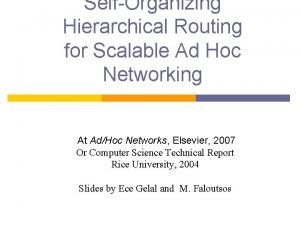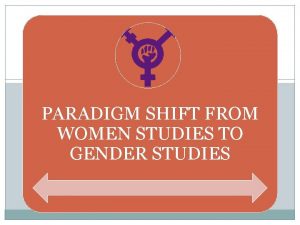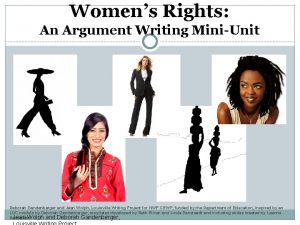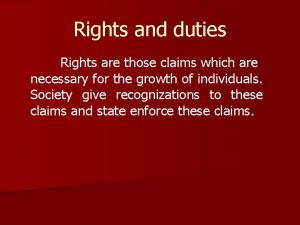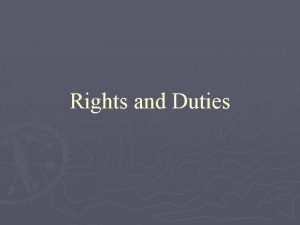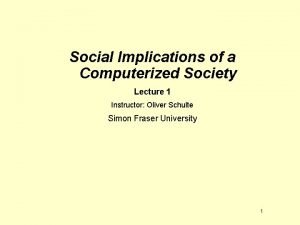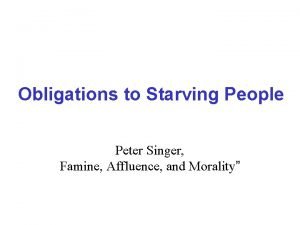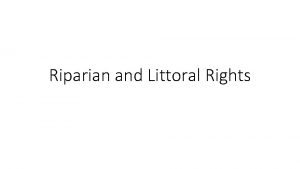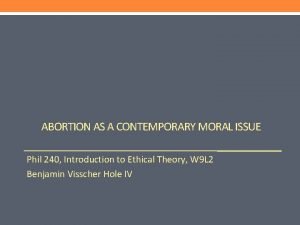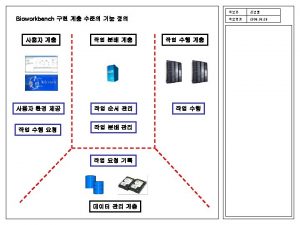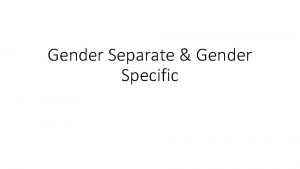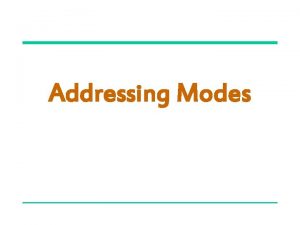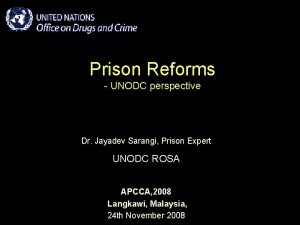RIGHTS OF WOMEN IN PRISON Addressing Gender Issues























![LEGAL ISSUES State of Rajasthan v Balchand Motiram [(1977) 4 SCC 308] Bail not LEGAL ISSUES State of Rajasthan v Balchand Motiram [(1977) 4 SCC 308] Bail not](https://slidetodoc.com/presentation_image_h/362f996e7ec49f4c83b89adfc86a8a4c/image-24.jpg)

![JUDICIAL OVERSIGHT Sunil Batra II Vs. Delhi Administration [1980 AIR 1579] Duty of Judges JUDICIAL OVERSIGHT Sunil Batra II Vs. Delhi Administration [1980 AIR 1579] Duty of Judges](https://slidetodoc.com/presentation_image_h/362f996e7ec49f4c83b89adfc86a8a4c/image-26.jpg)













- Slides: 39

RIGHTS OF WOMEN IN PRISON Addressing Gender Issues

16, 815 WOMEN IN PRISON as per NCRB PRISON STATISTICS 2012 as on 31 December 2012

11, 802 5, 013 Number of Undertrials Number of Convicts (70. 1%) (29. 9%)

WOMEN UNDERTRIALS

CASE - 1

QUESTION FOR YOU What are the legal rights of Shakuntala Devi vis-à-vis access to counsel?

LEGAL RIGHTS DURING STAGES OF PRE-TRIAL AND UNDERTRIAL A. 22(1), Constitution of India Right to consult, and to be defended by, a legal practitioner of his choice Article 39 -A, Constitution of India Free legal aid to poor and weaker sections of society, include those under detention S. 12(g), Legal Services Authority Act, 1987 Free legal aid to ‘any person in custody’ Khatri & Ors. v State of Bihar [(1981) 1 SCC 627] Md. Ajmal Md. Amir Kasab vs State Of Maharashtra (Cr Appl nos. 1899 -1900 of 2011) Duty of Court to inform of right to free legal aid, entitled to compensation for violation Sheela Barse vs. State of Maharashtra (1983) Legal Aid to be provided to distressed and poor people, especially women Suk Das v Union Territory of Arunachal Pradesh [A. I. R. 1986 S. C. 991] No lawyer, trial gets vitiated Legal Aid Cells by Delhi Legal Services Authority, Delhi High Court Legal Services Committee & NGOs and Para Legal Aides

QUESTIONS FOR YOU § Is it acceptable if she is not physically produced before the court? § Can she be released on bail?

LEGAL RIGHTS DURING STAGES OF PRE-TRIAL AND UNDERTRIAL Is it acceptable if she is not physically produced before the court? S. 167 (2) (b), Code of Criminal Procedure, 1973 Production – physically or through video linkage Elumalai v. State of Tamil Nadu [1983 --LW(Crl)121 - HC of Madras] M. A. Dharman v. State of Andhra Pradesh [1991 (1) ALT 315 – HC of Andhra Pradesh] Right to physical production before the Magistrate Can she be released on bail? S. 437 (1), Code of Criminal Procedure, 1973 (Non-bailable Offence) The court may direct that a person be released on bail if such person is under the age of sixteen years or is a woman or is sick or infirm Sharad Kumar vs. CBI [184(2011)DLT 193, High Court of Delhi] A woman is treated as a separate class in itself under the provision and should most definitely

QUESTIONS FOR YOU § Can a woman accused of a serious offence be allowed to meet with her family members? § What assistance could have been given to her by the prison staff to address her disturbed state of mind?

LEGAL RIGHTS Can a woman accused of a serious offence be allowed to meet with her family members? Ch-10, Rules 40 & 41, Delhi Prisons (Prisoners’ Welfare Fund, Appeals, Petitions, Interviews And Communications) Rules, 1988 Undertrials shall be granted facilities forwarding two letters and two interviews each week with their relatives or friends. Undertrials may see their duly qualified legal advisers without the presence of any other person. Ch V, Rule 27, Delhi Prisons Act, 2000 All blood relation prisoners, separated on grounds of different sex, shall be allowed to meet each other once a week in presence of a jail officer What assistance could have been given to her by the prison staff to address her disturbed state of mind? National Expert Committee on Women Prisoners (Justice Krishna Iyer Committee, 1987) Lack of psychiatric attention was a serious shortfall and affected the well-being of female prisoners. Recommended special arrangements to be made. Parliamentary Committee On Empowerment Of Women: Women In Detention (2001 -2002: Thirteenth Lok Sabha) Counselling by psychologists and psychiatrists must be provided for inmates, particularly for women who live away from their children and other dependents and may suffer mental breakdowns. Prompt remedial action to be taken by jail authorities to provide necessary care/treatment/health to women prisoners who become mentally ill while languishing in the jails.

QUESTIONS FOR YOU § As Jail Officer what will you do to help Shakuntala Devi obtain her legal rights? § How long will you take to provide her the same – chain of actions?

WOMEN CONVICTS

CASE - 2

QUESTION FOR YOU On discovering Vijay Kumari’s case and condition, what could the court and prison authorities have done for her release?

Benefits of Probation Section 360 Cr. P. C. Order to release on probation of good conduct on or after admonition When any person not under 21 years of age is convicted of an offence punishable with fine or with imprisonment for a term of 7 years or less, or when any person under 21 years of age or any woman is convicted of an offence not punishable with death or imprisonment for life, and no previous conviction is proved against the offender…the court may instead of sentencing him at once to any punishment, direct that he may be released on his entering into a bond, with or without sureties, to appear and receive sentence when called upon during such period (not exceeding 3 years) as the Court may direct and in the meantime to keep the peace and be of good behavior. Surjeet Kaur vs Probation Officer & Anr. (2012, Delhi High Court) A convict does not necessarily have to be sick or old or infirm to avail the benefit under S. 360 of the Cr. PC. A young, hail and hearty accused could also be entitled to the benefit of probation.

Benefits of Remission Section 432 Cr. P. C. Power to suspend or remit sentences When any person has been sentenced to punishment for an offence, the appropriate Government may, at any time, without conditions or upon any conditionms which the person sentenced accepts, suspend the execution of his sentence or remit the whole or any part of the punishment to which he has been sentenced. Sect. Ion 433 Cr. P. C. Power to commute sentence The appropriate Government may without the consent of the person sentenced commute any sentence of fine, or sentence of imprisonment, simple, rigorous or death sentence.

R D UPADHYAY VS. STATE OF AP & ORS. (2006) GUIDELINES FOR PREGNANT WOMEN IN PRISON • Before sending a pregnant woman to jail, the concerned authorities must ensure that jail in question has the basic minimum facilities for child delivery, as well as for providing adequate pre-natal and post-natal care for both, the mother and the child. • When a woman prisoner is found or suspected to be pregnant at the time of her admission or at any time thereafter, the lady Medical Officer shall report the fact to the Superintendent. • As soon as possible, arrangement shall be made to get such prisoner medically examined at the female wing of the District Government Hospital for ascertaining the state of her health, pregnancy, duration of pregnancy, probable date of delivery and so on. • After ascertaining the necessary particulars, a report shall be sent to the Inspector General of Prisons, stating the date of admission, term of sentence, date of release, duration of pregnancy, possible date of delivery and so on. • Gynaecological examination of female prisoners shall be performed in the District Government Hospital. • Proper pre-natal and post-natal care shall be provided to the prisoner as per medical advice.

QUESTIONS FOR YOU What are the special provisions for children of women in prison?

Ch-11, Rule 29 DELHI PRISONS (DISCIPLINE, DAILY ROUTINE, OFFENCES AND PUNISHMENTS) RULES, 1988 CHILDREN OF FEMALE PRISONERS 1. A child under the age of four years the offspring of a female prisoner, shall, if it has not been weaned or it has been weaned and no friend or relative can be found to take charge of it be admitted in jail with the mother 2. A child born in jail may be permitted to remain with the mother 3. As soon as any child admitted or born in jail attains the age of 4 years or female prisoner dies leaving a child under that age, the Superintendent shall communicate with the Magistrate of the District, with a view to the child being handed over to the charge of a relative or friends or being placed in an orphanage or being entrusted to some respectable person to be brought up at the expense of Government, if necessary until it attains an age of earning a livelihood. 4. Any female prisoner may be allowed to retain her child with her until it is four or with the approval of the Superintendent even up to 6 years of age. 5. In special circumstances, if the child is sick/mentally retarded/handicapped may also be allowed to stay with his/her mother if she desires when after attaining the age of 6.

R D UPADHYAY VS. STATE OF AP & ORS. (2006) GUIDELINES FOR CHILD BIRTH IN PRISON 1. Arrangements for temporary release/parole should be made to enable an expectant prisoner to have her delivery outside the prison. Only exceptional cases constituting high security risk or cases of equivalent grave descriptions can be denied this facility. 2. Births in prison, when they occur, shall be registered in the local birth registration office. But the fact that the child has been born in the prison shall not be recorded in the certificate of birth that is issued. Only the address of the locality shall be mentioned. GUIDELINES FOR FEMALE PRISONERS AND THEIR CHILDREN 1)Female prisoners shall be allowed to keep their children with them in jail till they attain the age of six years. 2)Upon reaching the age of six years, the child shall be handed over to a suitable surrogate as per the wishes of the female prisoner or shall be sent to a suitable institution run by the Social Welfare Department. 3)The child should be transferred to a nearby institution in order to minimise undue hardships on both mother and child due to physical distance. 4)Such children shall be kept in protective custody until their mother is released or the child attains such age as to earn his/her own livelihood. 5)Children kept under the protective custody in a home of the Department of Social Welfare shall be allowed to meet the mother at least once a week. The Director, Social Welfare Department, shall ensure that such children are brought to the prison for this purpose on the date fixed by the Superintendent of Prisons.

R D UPADHYAY VS. STATE OF AP & ORS. (2006) GUIDELINES FOR FOOD, CLOTHING, MEDICAL CARE AND SHELTER 1. Children in jail shall be provided with adequate clothing 2. State/UT Govts shall lay down dietary scales for children keeping in view the calorific requirements of growing children as per medical norms. 3. Separate utensils of suitable size and material should also be provided to each mother prisoner for using to feed her child. 4. Clean drinking water must be provided to the children which must be periodically checked 5. Children shall be regularly examined by the Lady Medical Officer to monitor their physical growth and shall also receive timely vaccination. 6. Extra clothing, diet and so on may also be provided on the recommendation of the Medical Officer. 7. In the event of a woman prisoner falling ill , alternative arrangements for looking after children must be made by the jail staff. 8. Sleeping facilities provided to the mother and child should be adequate, clean and hygienic. 9. Children of prisoners shall have the right of visitation. 10. The Prison Superintendent shall be empowered in special cases to admit children of women prisoners to prison without court orders provided such children are below 6 years of age. GUIDELINES FOR DIET 1)The child should be provided at least 600 ml. of undiluted fresh milk over 24 hours if the breast milk is not available. 2)The food groups should be provided in order to ensure that both macronutrients and micronutrients are available to the child in adequate quantities.

QUESTION FOR YOU Can a prisoner ever be released on bail if she doesn’t have surety?
![LEGAL ISSUES State of Rajasthan v Balchand Motiram 1977 4 SCC 308 Bail not LEGAL ISSUES State of Rajasthan v Balchand Motiram [(1977) 4 SCC 308] Bail not](https://slidetodoc.com/presentation_image_h/362f996e7ec49f4c83b89adfc86a8a4c/image-24.jpg)
LEGAL ISSUES State of Rajasthan v Balchand Motiram [(1977) 4 SCC 308] Bail not Jail - Depriving a person of liberty is a last resort. Bail not jail is the rule. Bail must be granted unless there are reasonable grounds to believe that the suspect would suborn the process of law or flee from justice. Moti Ram v. State of M. P. [(1978) 4 SCC 47] Guidelines in granting bail - An accused person should not be required to produce a surety from the same district especially when he is a native of some other place. Bail covers release on one’s own bond, with or without sureties. Bail should be given liberally to poor people simply on a personal bond, if reasonable conditions are satisfied. The bail amount should be fixed keeping in mind the financial condition of the accused. When dealing with cases of persons belonging to the weak categories in monetary terms - indigent young persons, infirm individuals or women - courts should be liberal in releasing them on their own recognizance.

QUESTION FOR YOU What would you have done to prevent Vijay Kumari’s long and unnecessary detention?
![JUDICIAL OVERSIGHT Sunil Batra II Vs Delhi Administration 1980 AIR 1579 Duty of Judges JUDICIAL OVERSIGHT Sunil Batra II Vs. Delhi Administration [1980 AIR 1579] Duty of Judges](https://slidetodoc.com/presentation_image_h/362f996e7ec49f4c83b89adfc86a8a4c/image-26.jpg)
JUDICIAL OVERSIGHT Sunil Batra II Vs. Delhi Administration [1980 AIR 1579] Duty of Judges and Magistrates to visit prisons - To make prisoners' rights in correctional institutions viable, we direct the District Magistrate concerned to inspect the jails in his district once every week, receive complaints from individual prisoners and enquire into them immediately. Common Cause Vs Union of India & Others [Writ Petition (C) No. 1128 of 1986] Undertrial Review Committee - The District Level Review Committees for Under Trial prisoners should meet, without fail, at least once in every 3 months and review the cases of all prisoners who are in Judicial Custody for periods of six months or more. Supreme Court Legal Aid Committee Vs Union of India [1994 SCC (6) 731] Establishment of Review Committees – The Apex court recommended State Governments to set up Review Committees headed by judicial

PRISON VISITING SYSTEM Sunil Batra (II) vs Delhi Administration (1980 AIR 1579) “The board, which includes judicial officers and people from varied social backgrounds and is vested with ‘Visitorial powers’, could be an instant administrative grievance redressal mechanism to protect the rights of prisoners. ” Rakesh Kaushik Vs. BL VIG Superintendent Central Jail, New Delhi (AIR 1981 SC 1767) “…part of their function was to acquaint themselves with the condition of tension, vice and violence and prisoners’ grievances. ” Ranchod Vs. State of M. P. (1986 16 Reports M. P. 147) “The non-official visitors to the jail, appointed by the State Government, had they justified their appointment by getting themselves acquainted with the prisoners’ problems and making efforts for amelioration of their lot, within the framework of the Jail Manual itself; if all this had been going on smoothly, as is expected and sought to be, possibly there was no need for… this letter petition. ”

PRISON MONITORING MECHANISMS RD Upadhyay Vs. State of AP & Ors. (2006) SLSA to periodically inspect jails to monitor directions regarding mother and children Tapas Kumar Bhanja Vs. State of West Bengal and Anr. (2006, High Court of West Bengal) Human Rights Commission to send teams from time to time for seeing as to whether the inmates are safe and are kept in humanitarian condition.

PRISON MONITORING MECHANISMS PRISON VISITING SYSTEM CHAPTER 5, DELHI PRISONS (VISITS OF PRISONS) RULES, 1988 1. Commissioner of Police and Sessions Judges are required to visit the jails once in three months and once a month, respectively. 2. District Magistrates are required to visit the jails once fortnight. 3. It shall be the duty of every official visitor to satisfy himself that the provisions of the Prisons Act, 1894, and of all rules, regulations, orders, and directions made or issued thereunder, are duly observed, and to hear any complaint by any prisoner. 4. All non-official visitors shall be afforded every facility for observing the state of the jail, and the management thereof. And shall be allowed access to all parts of the jail and to every prisoner confined. 5. Lady visitors shall have the same powers and duties as the male visitors, except that their functions shall extend only to the female prisoners In of the jail.

QUESTIONS FOR YOU § Had Kanhaiya not been waiting for her, what would have been the fate of Vijay Kumari? § How would you then assist Vijay Kumari?

LEGAL ISSUES Ch-6, Rule 104 DELHI PRISONS (ADMISSION, CLASSIFICATION, SEPARATION, REMISSION, REWARD AND RELEASE OF PRISONERS) RULES, 1988 RELEASE OF FEMALE PRISONERS – In the event of no relative appearing to receive a female prisoner and she is likely to be led astray or is young, she should, if willing to accept the escort, be sent to her home in charge of the female warder OR a respectable woman entertained for the purpose. If this escort is not considered necessary, the prisoner shall be released in the ordinary way, after making an entry in the release register to this effect.

REHABILITATION SCHEMES Shelter and Support Scheme for Women in Difficult Circumstances (Swadhar) A Scheme for women in difficult circumstances and provides primary need of shelter, food, clothing, emotional care and legal and clinical support. It also attempts to rehabilitate them socially and economically through education, awareness, skill upgradation and personality development through behavioral training. The scheme specifically defines women prisoners released from jail and without family support as the beneficiary of the Swadhar scheme. Scheme for Working Women Hostel The scheme aims to promote availability of safe accommodation for working women, with day care facility for their children in both rural and urban areas. Short Stay Home For Women and Girls (SSH) It provides for short-term stay homes with psychological support and care from a period ranging between 6 months to 3 years. Support to Training-Employment Programme (STEP) The scheme encourages women to form groups and makes facilities available through and access to credit. It also provides skill upgradation and links women to employment-cum-income generation programmes. The beneficiaries under the projects will be poor or assetless marginalised women with special focus on SC/ST households, women headed households and families below the poverty line. Integrated Women’s Empowerment Programme (Swayamsiddha) The scheme works for holistic empowerment of women through formation and working of Self Help Groups (SHGs).

OTHER ISSUES

OTHER ISSUES Repatriation of Foreign National Limited Number of Reformatories and their location Prisons are predominantly male centered Stereotypical options of Correction Vulnerability to sexual abuse, death & suicide Poor Staffing: less number of women warders Stigma & lack of tracking of ex-prisoners

UN’s Bangkok Rules for Treatment of Women Prisoners Women should be sent to prisons closer to their homes as far as it is possible, to help their social rehabilitation. The accommodation of women prisoners shall have facilities and materials required to meet women’s specific hygiene needs. Their health screening should be comprehensive and include primary health care, mental health care needs, and identification of sexual abuse prior to admission.

Thank you! Prison Reforms Programme Behind Bars Not Beyond Justice Commonwealth Human Rights Initiative

OTHER ISSUES ADMISSION TO JAIL 1. Women under trials shall be admitted whatever time presented for admission by Police & on all days including Sunday and Jail holidays (Ch-6, Rule 2(i), Delhi Prisons Rules, 1988) 2. Juvenile: If a girl appears to be less than 16 years of age at the time of his admission to jail, Superintendent shall have her immediately examined medically and if her age is confirmed to be less than 16 years, then will be referred to the concerned trial court for her detention in a Juvenile Home (Ch-6, Rule 24, Delhi Prisons Rules, 1988) SEARCH OF PRISONERS 1. Search shall be carried out by the matron and medical examination by the female medical officer (Ch VI, Rule 24, Delhi Prisons Act, 2000 & Ch-6, Rule 26, Delhi Prisons Rules, 1988) SEPARATION OF PRISONERS 1. Females shall be imprisoned in separate buildings, or separate parts of the same building (Ch V, Rule 27, Delhi Prisons Act, 2000) 2. Female prisoners convicted or charged for an offence under the Immoral Traffic (Prevention) Act, 1956 (104 of 1956) for any sexual or other offence involving grave moral depravity, shall be segregated from all other types of female prisoners (Ch V, Rule 27, Delhi Prisons Act, 2000) 3. All blood relation prisoners, separated on grounds of different sex, shall be allowed to meet each other once a week in presence of a jail officer (Ch V, Rule 27, Delhi Prisons Act, 2000)

OTHER ISSUES SAFE CUSTODY AND SECURITY OF PRISONERS 1. No handcuffs and fetters shall be imposed in respect of Female prisoners (Ch XII, Rule 56, Delhi Prisons Act, 2000) 2. No Police Officers be allowed to enter any female ward without the permission in writing, of the Superintendent [Ch-5, Rule 20, Delhi Prisons (Visits Of Prisons) Rules, 1988] 3. No women prisoner shall be removed from the women section, except, with the special permission of the Superintendent [Ch-8, Rule 3(2), Delhi Prisons Rules, 1988] 4. No male officer including Superintendent shall enter the women section of the prison without lady Assistant Superintendent or Matron; during night to enforce discipline amongst female prisoners or medical assistance (Ch-8, Rule 3(4), Delhi Prisons Rules, 1988) 5. Register of Visits To Be Maintained (Ch-8, Rule 4, Delhi Prisons Rules, 1988) for women inmates & staff 6. Female under trial shall with the permission of the Superintendent have the choice of occupying a cell instead of ward: Provided that a cell is available (Ch-11, Rule 27, Delhi Prisons Rules, 1988) 7. When a female prisoner is the only occupant of a ward, female warder to remain with her both by day and night (Ch-11, Rule 28, Delhi Prisons Rules, 1988)

OTHER ISSUES PHYSICAL APPEARANCE 1. Females shall not have their hair cut or removed in any way (Ch-8, Rule 31(c), Delhi Prisons Rules, 1988) SUPPLY OF FOOD AND CONCERTANTS OF THE FEMALE ENCLOSURE 1. Cooked food shall be brought to the female enclosure gate from which it shall be taken inside by the female warder or a female prisoner (Ch-11, Rule 31, Delhi Prisons Rules, 1988) MEDICAL EXAMINATION OF WOMEN 1. Women prisoners, before being removed to any other prison, shall be examined by Female Medical Officer (Ch IV, Rule 26, Delhi Prisons Act, 2000) 2. No prisoners shall be discharged against his will from prison if laboring under any acute or dangerous distemper, not until the opinion of Female Medical Officer (Ch IV, Rule 26, Delhi Prisons Act, 2000) 3. Duty of every warder to call the attention of the Medical Staff to any female prisoner who complaints of being, or appears to be ill; to satisfy herself that every female prisoner who is sick receives the special diet (if any) at any time prescribed for her by the Medical Officer (Ch-13, Rule 81, Delhi Prisons Rules, 1988)
 Flat addressing vs hierarchical addressing
Flat addressing vs hierarchical addressing Washington state women's prison
Washington state women's prison Strategic gender needs and practical gender needs
Strategic gender needs and practical gender needs Paradigm shift from women studies to gender studies
Paradigm shift from women studies to gender studies Chapter 12 lesson 3
Chapter 12 lesson 3 Women's rights movement
Women's rights movement Spartan women rights
Spartan women rights Womens rights
Womens rights Causes of thyroid in female
Causes of thyroid in female Negative rights vs positive rights
Negative rights vs positive rights Duty towards self
Duty towards self Negative right
Negative right Legal rights vs moral rights
Legal rights vs moral rights Positive rights and negative rights
Positive rights and negative rights Negative rights
Negative rights Littoral rights real estate
Littoral rights real estate Negative right
Negative right Hindelbank prison
Hindelbank prison Prison ministry training manual download
Prison ministry training manual download Preschool to prison pipeline
Preschool to prison pipeline Stanford prison experiment consent form
Stanford prison experiment consent form School-to-prison pipeline
School-to-prison pipeline Theme of chapter 23 to kill a mockingbird
Theme of chapter 23 to kill a mockingbird To althea from prison summary
To althea from prison summary Penal reform trust
Penal reform trust Qalakabusha prison
Qalakabusha prison Judge challeen poem
Judge challeen poem Summary of mid term break
Summary of mid term break Oslo prison
Oslo prison Famous san quentin prisoners
Famous san quentin prisoners Bene gesserit
Bene gesserit Token economy examples for adults
Token economy examples for adults Judy buenoano
Judy buenoano Andersonville prison
Andersonville prison Barn- och elevombudet
Barn- och elevombudet Red wings marquette prison
Red wings marquette prison Tsing tsing prison
Tsing tsing prison Prison break algorithm
Prison break algorithm Prison
Prison Kilmarnock prison
Kilmarnock prison
